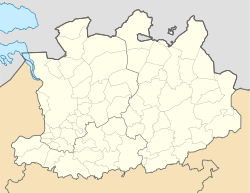Borgerhout
Berchem | |
|---|---|
![District House of Borgerhout [nl]](http://upload.wikimedia.org/wikipedia/commons/thumb/5/5d/Borgerhout_Gemeentehuis2.JPG/250px-Borgerhout_Gemeentehuis2.JPG) | |
 Location of Borgerhout in Antwerp | |
| Coordinates: 51°13′00″N 4°26′00″E / 51.21667°N 4.43333°E | |
| Country | |
| Community | |
| Region | |
| Province | |
| Arrondissement | Antwerp |
| Municipality | Antwerp |
| Area | |
| • Total | 3.93 km2 (1.52 sq mi) |
| Population (2021)[1] | |
| • Total | 45,769 |
| • Density | 12,000/km2 (30,000/sq mi) |
| Postal codes | 2140 |
| Area codes | 03 |
| Website | [1] |
Borgerhout (Dutch pronunciation: [ˈbɔrɣərˌɦʌut] ) is the smallest district of Antwerp, Belgium. As of 2021[update], the district houses 45,769 inhabitants on 3,93 km².[1] It was an independent municipality until January 1983. The postal area code for Borgerhout is 2140.
Geography
[edit]Borgerhout is divided into two parts by a highway and the historical walls.[2] The part inside those walls is "intra muros," meaning (within the walls). It is built around a big boulevard, the Turnhoutsebaan. The Turnhoutsebaan is the biggest shopping street, offering both food and clothing, in both Belgian and foreigner's stores. "Intra muros" is the young and trendy part of Borgerhout, with a lot of so-called "hipster bars", although in the last few years "extra muros" is getting more popular and trendy, especially around the Te Boelaarpark with a lot of new businesses like bars and restaurants popping up.
Demographics
[edit]Borgerhout has an extremely diverse population, with 63% percent of inhabitants having non-Belgian ancestry. Of the nine districts of Antwerp, it has the highest population density.[3]
History
[edit]Borgerhout was first mentioned in the year 1214 in an act written by the Duke of Brabant. It was then named 'Borgerholt'.[4]
Etymology
[edit]"Borger" likely comes from the old word for citizen or city dweller. Currently, the Dutch word for this is "burger". It might also refer to the word "borgh", meaning a fortress or fortified building. Borghmeester (1254) or borgermeyster (1286) are mentioned in written sources as the word for "mayor", literally "master of the fortress" or "master of the citizens".[5] "Hout" (or previously "holt) means "wood". It is similar to some naming conventions in English, for example "Hollywood". It refers to a time when Borgerhout was still much greener, and had not yet merged with greater Antwerp. It likely also explains the tree on the coat of arms.
People from Borgerhout
[edit]Born in Borgerhout
[edit]- Bachir Boumaaza (born 1980), known by his pseudonym Athene, gaming social activist and internet personality
- Guillaume Geefs (1805–1883), sculptor
- Floris Jespers (1889–1965), painter
- Nahima Lanjri (born 1968), politician
- Sister Leontine (1923–2012), pioneer of palliative care[6]
- Milow (Jonathan Vandenbroeck) (born 1981), singer-songwriter
- André Nelis (1935–2012), sailor
- Joris Note (born 1949), writer
- Stan Ockers (1920–1956), cyclist
- Hugues C. Pernath (1931–1975), poet
- Maria Rosseels (1916–2005), journalist and actor
- Michel Seuphor (1901–1999), artist
- Paul van Morckhoven (1910–1990), dramatist and theatre critic
- Robert Van Straelen (born 1934), economist
- Thomas Vinçotte (1850–1925), sculptor
- Eddy Wauters (born 1933), football player
(Former) inhabitants of Borgerhout
[edit]- Tom De Cock (born 1983), writer and radio–DJ
- Saskia De Coster (born 1976), writer
- Bart Martens (born 1969), politician and a member of the SP.A
- Alfred Ost, (1884–1945), artist
- Anne Provoost (born 1964), writer
- Wouter Van Besien (born 1972), politician, chairman of the ecologist party Groen!
- Tom Van Laere (born 1974), musician
- Erik Van Looy (born 1962), film director
- Rik Van Steenbergen (1924–2003), racing cyclist
- Carl Verbraeken (born 1950), president of the Union of Belgian Composers
https://nl.wikipedia.org/wiki/Reuskens van Borgerhout==Gallery==
-
Town hall until 1890
-
Reuskens of Borgerhout
References
[edit]- ^ a b c "Bevolking per statistische sector - Sector 11002S". Statistics Belgium. Retrieved 9 May 2022.
- ^ "Kaart van Borgerhout – Kaarten van Antwerpen". 23 October 2021.
- ^ "Dashboard".
- ^ "Borgerhout".
- ^ "Waarom schrijven we burgemeester en niet burgermeester?". 15 November 2018.
- ^ "Geschiedenis". www.gza.be. Retrieved 28 August 2016.







